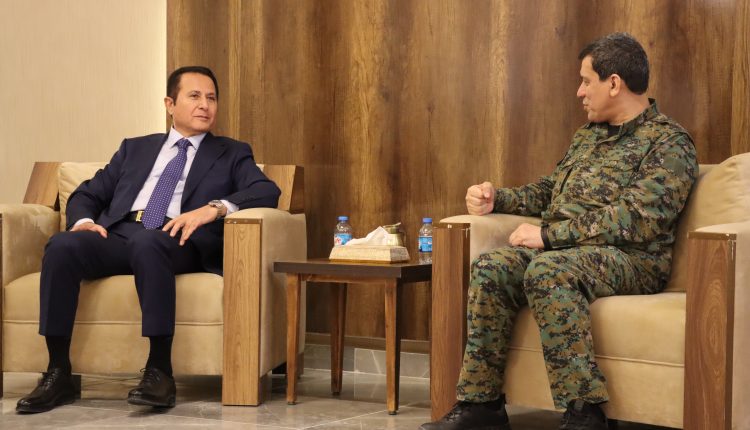Iraqi Kurdistan’s Senior Official Meets Syria’s SDF Leader in Northern Syria, Discussing Kurdish Unity
HASAKAH, Syria (North Press) – On Monday, the Syrian Democratic Forces (SDF) issued a statement regarding a meeting between their Commander-in-Chief, General Mazloum Abdi, and Dr. Abdul Hamid Derbendi, the representative of Kurdish leader President Masoud Barzani. The meeting took place in Hasakah, northeastern Syria.
Earlier in the day, a senior Kurdish party official informed North Press that Dr. Derbendi, representing President Masoud Barzani of the Kurdistan Democratic Party (KDP) in Iraq’s Kurdistan Region, was holding discussions with General Abdi in Hasakah.
Focus on Kurdish Unity
In its statement, the SDF said, “The Commander-in-Chief of the Syrian Democratic Forces welcomed Dr. Abdul Hamid Derbendi, the representative of President Masoud Barzani, in a meeting that addressed the latest developments in Kurdish and regional affairs.”
The statement continued, “During the meeting, Dr. Derbendi conveyed a message of support from President Barzani, emphasizing the importance of Kurdish unity and strengthening joint efforts to face the current challenges in Syria.”
General Abdi expressed his gratitude for President Barzani’s message and support, reaffirming the need for collaboration among Kurdish parties.
“The current phase requires collective efforts from all Kurdish sides to achieve stability and safeguard the interests of the Kurdish people,” the SDF statement noted.
Regional Context
The meeting underscores ongoing efforts to foster unity and cooperation among Kurdish factions in the face of regional instability and political challenges. The Kurdish population in Syria, Iraq, and other neighboring countries continues to face political marginalization and security threats.
President Barzani, a prominent Kurdish leader and head of the KDP, has long advocated for greater collaboration between Kurdish entities to address shared challenges.
This meeting comes at a critical time as the SDF, a key partner in the U.S.-led coalition against ISIS, navigates increasing political and security pressures in northeastern Syria.
A Call for Cooperation
Observers note that the meeting reflects a broader effort to consolidate Kurdish political and military positions in light of escalating regional complexities, including Turkish military threats and shifting dynamics in Syria’s political landscape.
While details of the discussions remain confidential, the emphasis on unity and cooperation signals a potential strengthening of ties between the SDF and Kurdish leadership in the Kurdistan Region of Iraq.
Background: Divided Syrian Kurds
The intra-Kurdish dialogue involves, in essence, two influential Kurdish political actors:
1.The Kurdish National Unity Parties (PYNK) that includes the Democratic Union Party (PYD) is the dominant political force in northeast Syria, aligned with the Syrian Democratic Forces (SDF).
2. The Kurdish National Council in Syria (KNC): A coalition of Kurdish parties affiliated with the Turkish-backed Syrian opposition, often aligned with the Kurdistan Regional Government (KRG) in Iraq.
Tensions between these actors date back to the early years of the Syrian civil war. The PYD accused the KNC of failing to support the Kurdish-led struggle in the face of existential threats, including ISIS and Turkey. However, the KNC often criticized what it calls “the exclusionary nature” of its governance and accused it of suppressing political dissent.
These divisions have long plagued the ability of the Kurds to present a united front in negotiations over Syria’s future, diminishing their leverage with both international actors and the Syrian government.
Status of the current dialogue
The intra-Kurdish talks, initiated in 2020 under U.S. auspices, have made intermittent progress but have faced numerous challenges. Key sticking points include the distribution of political power, the integration of KNC representatives into the AANES, and the management of local security forces.
After setbacks, reports in recent days suggest a new impetus toward consensus. The two sides have reportedly agreed in principle on the importance of inclusiveness at the level of governance and equitable resource distribution. The revival of the dialogue comes against the backdrop of increased regional tensions: the Turkish military operation that started in northern Syria and growing economic pressure on the region.

